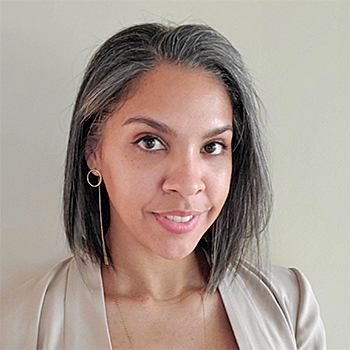Location
NCRC-B28 3005E (Faculty Office)
NCRC-B10 G034 Computational Lab (Research Lab)
Phone
Website
Biography
Additional Titles
- Assistant Professor, Applied Physics
- Assistant Professor of Chemical Engineering
News
Education
University of Minnesota, Twin Cities
PhD Chemical Physics, 2016
University of Minnesota, Twin Cities
MS Chemical Physics, University of Minnesota Twin Cities, 2012
Wayne State University
BS Chemical Engineering, 2010
Research Interests
Dr. Lindsey’s group studies chemistry in inherently multiscaled systems and material evolution under extreme and dynamically changing conditions through advanced simulations and machine learning.
Nanomaterial design and discovery: There is tremendous interest in achieving tunable synthesis of nanomaterials due to their utility in fields spanning quantum computing, catalysis, energy, drug delivery, national security, and more. Shock-compression methods are particularly attractive for nanocarbon synthesis since they can produce products extremely rapidly and enable access to exotic allotropes. However, they remain far from tunable due to the limited understanding of the governing phenomena resulting from difficulties of driving materials from ambient to extreme conditions and observing the rapid, reaction-driven, and multiscaled system evolution. To circumvent these challenges, our group develops and applies advanced simulation approaches enabling an otherwise inaccessible atomistically resolved view of ensuing phenomena. Using these methods, we aim to establishing rational design principles and tools for tunable shock-synthesis of next generation nanocarbon materials.
Machine Learning and Data Science: Atomistic simulations can be a powerful tool for generating scientific insights, guiding, and aiding in interpretation of experiments, and generating input for larger scale, lower resolution simulations (e.g., continuum modeling), but they rely on availability of suitable interatomic models. Atomistic simulations have historically struggled to describe chemistry in condensed phase and inherently multiscaled systems (i.e., those central to H-storage system design, sorbent optimization, heterogenous catalysis, etc.), since they necessitate both the accuracy of quantum-mechanics and computational efficiency of relatively simple molecular mechanics models. To bridge this capability gap, our group develops AI-driven simulation tools enabling agile generation of robust machine-learned interatomic models for quantum-accurate reactive simulation on unprecedented scales. Our group also develops machine learning tools to aid in interpretation of large experimental datasets and to develop material diagnostic and performance models from them.
Chemistry under extreme conditions: Chemistry occurring under extreme and dynamically changing conditions has implications for a myriad of applications spanning next-generation material processing techniques (e.g., laser ablation, sonication and electron-beam modification), defense applications (e.g., detonation science), and sustainable energy (e.g., nuclear power). To facilitate advances in these areas, our group employs multiscale simulation approaches probing ensuing dynamics, equation of state, thermochemistry, and microstructural evolution.
Materials & Radiation Effects
Professional Service
University of Michigan
Assistant Professor, 2022 – present
Lawrence Livermore National Laboratory (LLNL)
Staff Research Scientist, 2018 – 2022
Lawrence Livermore National Laboratory
Post-doctoral Associate, 2016 – 2018Professional Service
- Guest Editor: Propellants Explos. Pyrotech.: Special Issue on Machine Learning and Data Science for Energetic Materials, 2022
- Conference Technical Committee Member: American Physical Society (APS) Shock Compression of Condensed Matter Topical Group (SCCM) Biannual Meeting, 2022
- Advisory board member: Institute of Computational Science & Engineering, 2022 – Present
- Elected Member-at-Large: APS SCCM Topical Group, 2022 – Present
- LLNL Materials Science Division AI, ML, and Data Science Committee (Surrogate modeling and Data Management co-lead), 2021 – 2022
- Co-director: LLNL Computational Chemistry & Materials Science, Summer Institute (CCMS) 2021 – 2022
- Committee Member: LLNL CCMS, 2019 – 2020
- Liaison to the Director: American Institute of Chemical Engineers (AIChE) Computational Molecular Science & Engineering Forum, 2019 – 2021
- UMN Chemistry Department Diversity Committee, 2015 – 2016
- Officer: UMN Association of Multicultural Scientists, 2010 – 2016
Honors and Awards
- LLNL Physical and Life Sciences Directorate Research Award, 2019
- Springer Poster Prize; Foundations of Molecular Modeling and Simulations Mtg., 2018
- Colloids Division Poster Prize; American Chemical Society (ACS) National Mtg., 2016
- J. Mater. Chem. Poster Prize; Foundations of Molecular Modeling & Simulations Mtg., 2015
- National Science Foundation Pan-American Advanced Studies Institute Award, 2012
- Student Poster Prize; AIChE National Mtg., 2009
- WSU Ernest B. Drake Leadership Scholarship, 2009
- WSU Honors College Research Grant, 2009
- WSU Honors College Research Grant, 2008
